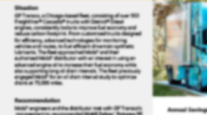Lawmaker Proposes 15¢ Increase in Fuel Tax
This story appears in the Dec. 9 print edition of Transport Topics.
WASHINGTON — An Oregon congressman has introduced legislation that would boost federal taxes on diesel and gasoline to fill a widening shortfall in the federal government’s main source of transportation funding.
U.S. Rep. Earl Blumenauer (D) on Dec. 4 unveiled the “Update, Promote and Develop America’s Transportation Essentials Act of 2013” — H.R. 3636 — which would gradually add 15 cents to diesel and fuel tax by 2016.
The current tax is 24.4 cents per gallon on diesel and 18.4 cents per gallon on gasoline.
After 2016, fuel taxes would be indexed to inflation.
Blumenauer said during a news conference here that Congress no longer can afford to wait to keep solvent the Highway Trust Fund, which pays for most of the federal government’s investment in roads, bridges and transit. Increasing federal fuel taxes also was recommended by the Simpson-Bowles deficit reduction plan.
American Trucking Associations has led an effort in recent years to boost federal fuel taxes but has met stiff resistance on Capitol Hill and at the White House.
“For the last two decades, we’ve been in a state of slow decline. Frankly, there has been a bipartisan failure of will,” Blumenauer
said at the news conference, where he was joined by representatives from labor, business, trucking, transit, and road builder groups.
“For all the talk of the budget deficit, we’re facing an infrastructure deficit,” he said.
ATA has long supported an increase in fuel taxes to keep up with the nation’s infrastructure needs and ensure freight moves efficiently. A fuel tax is the most effective funding source because it is collected from users and has minimal administrative costs, Mary Phillips, ATA senior vice president of legislative affairs, said at the news conference.
“Our support for raising the fuel tax should clearly demonstrate just how critical good roads are for moving freight, commuters, vacationers and shoppers,” she said.
Fuel taxes currently bring in about $38 billion a year.
Congress most recently raised the fuel tax by 4 cents in 1993, but its purchasing power has diminished. Inflation, more efficient vehicles on the road and people driving less have contributed to a gap in the Highway Trust Fund.
Congress has filled the gap by transferring about $54 billion from the general fund since 2008, according to the Congressional Budget Office. But the Highway Trust Fund will be $15 billion short in 2015, and the gap will continue to grow unless Congress backfills from the general fund, slashes spending or boosts revenue, the agency said.
CBO estimates that a 10-cent increase would be sufficient to keep the Highway Trust Fund solvent. Had fuel taxes been indexed to inflation in 1993, the diesel tax today would be about 39 cents per gallon, according to CBO.
The American Society of Civil Engineers estimates the U.S. should invest at least $500 billion by 2020 in its surface transportation system to meet economic and transportation needs, according to the legislation.
Blumenauer acknowledged the gas tax is unpopular with the public and that an increase doesn’t have strong odds of passing. House Republicans have opposed any tax increases. Meanwhile, MAP-21, the current surface transportation authorization law, is set to expire in September 2014, about six weeks before the midterm elections.
He said he hopes that he can garner a hearing on transportation financing and spur proposals from other members of Congress.
“This is not about the gas tax. It’s about paying for what we use and investing in our future,” Blumenauer said. “It isn’t popular — everybody wants somebody else to take the first step.”
On average, states receive about 60% of transportation capital funding from the federal government, said Pete Ruane, CEO of the American Road and Transportation Builders Association.
Inaction means Congress also would risk cuts to highway and transit projects just before the midterm elections, he said.
The way the fuel tax is distributed, according to the U.S. Department of Transportation: Of diesel’s 24.4 cents, 21.44 cents goes to the Highway Trust Fund’s Highway Account, and 15.44 cents of gasoline’s 18.4 cents goes there. An additional 2.86 cents from both fuels goes to the Highway Trust Fund’s Mass Transit Account, and 0.1 cent goes to its Leaking Underground Storage Tank Trust Fund.
The newly introduced measure calls for replacing the gas tax with a “more sustainable, stable funding source” by 2024.
Blumenauer also introduced a second House bill, the “Road Usage Fee Pilot Program,” under which grants would be issued to states to test methods of taxing drivers based on how many vehicle miles they travel. Oregon has tested such a tax in recent pilot programs.




